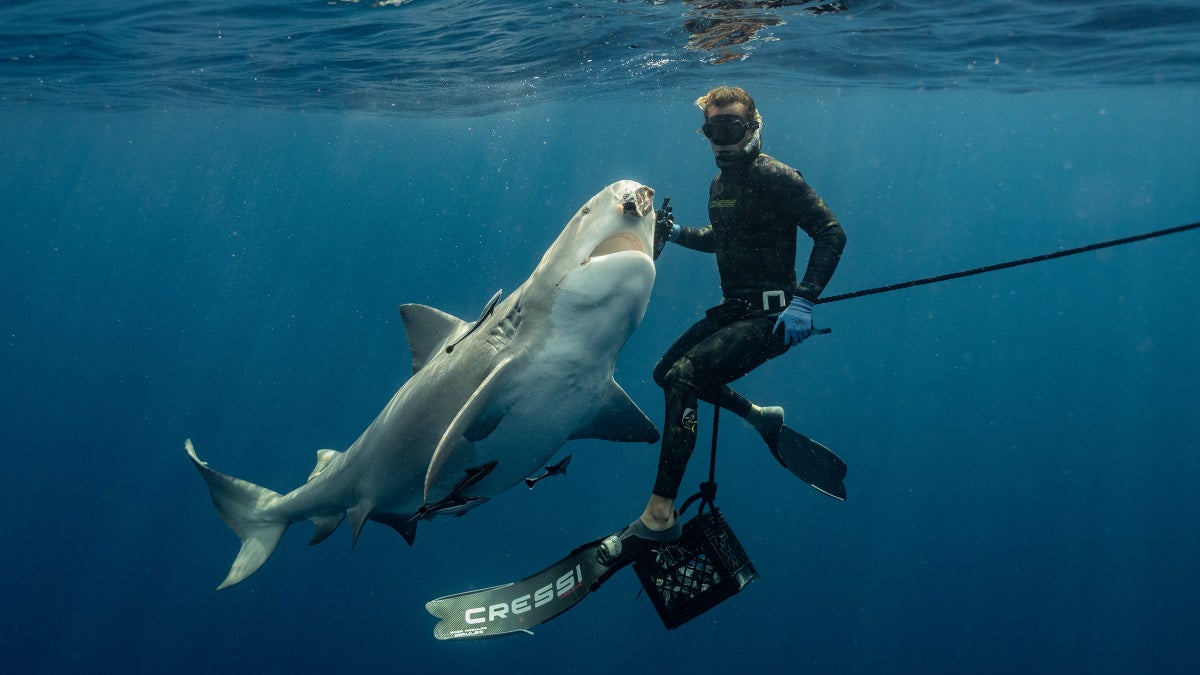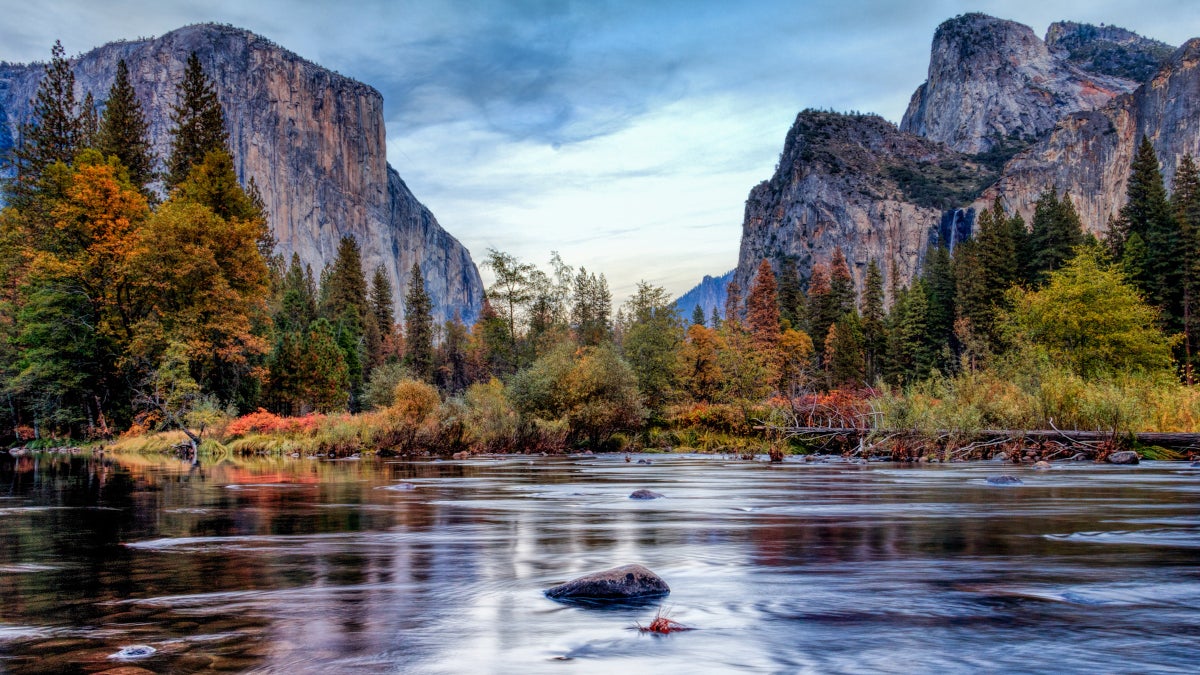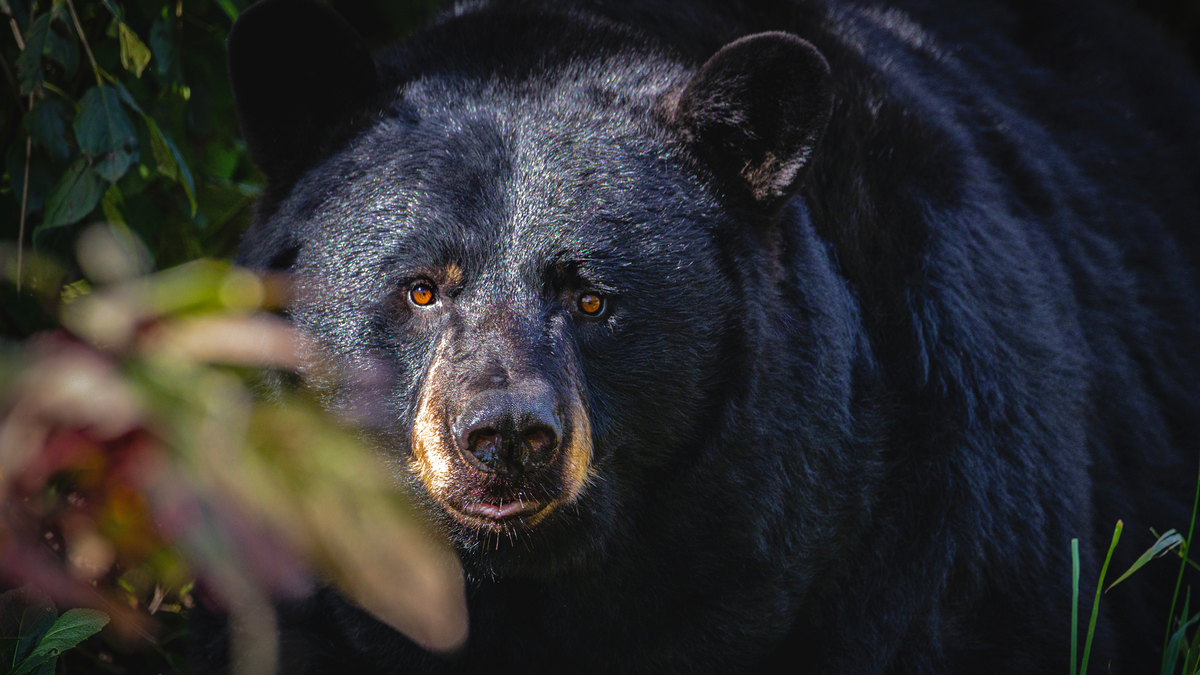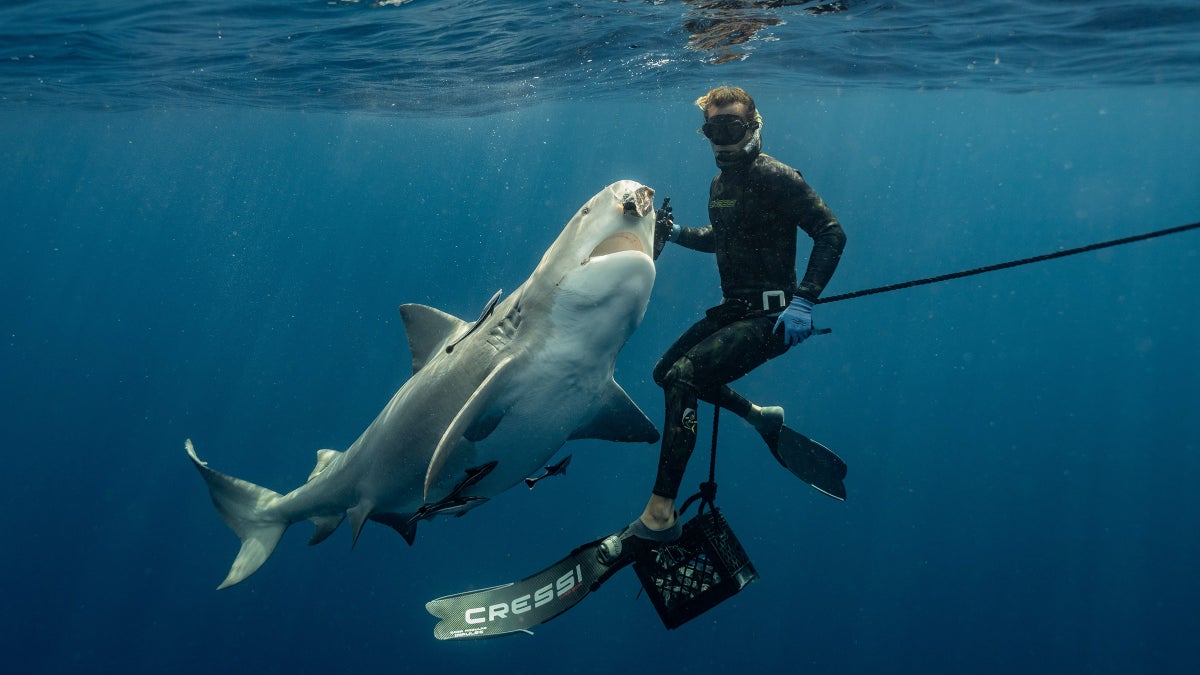
In June, Tanner Mansell, a diving guide and shark photographer who lives in Jupiter, Florida, was piloting his boat back to shore when he spotted two bright red objects floating in the water. As Mansell, 32, got closer, he realized they were gasoline cans, and he could smell the fuel dripping into the ocean.
His crew suggested they drag the containers onto the boat, to prevent more toxic liquid from dripping into the sea, but Mansell stopped, petrified by a panic attack.
His mind raced through unlikely scenarios: What if the cans were full of drugs? What if they belonged to someone important? What if doing the right thing put him on the wrong side of the law?
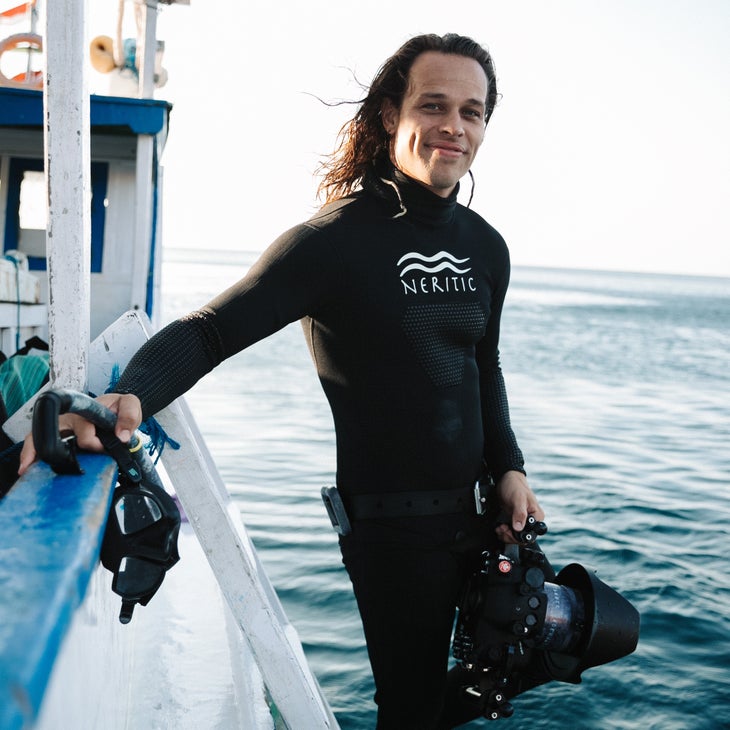
“Logically, I’m thinking, ‘Yeah, there’s gas leaking into the ocean right in front of us, we should get these cans out of the water,’” he told Outside. “But another part of me is like, ‘I don’t want to touch anything out here ever again.’”
Mansell’s bizarre reaction is the product of the last five years of his life, during which he was declared a felon by the federal government for doing something that, at the time, he believed was the right thing to do.
A legal case drained him of his resources and energy. For several years he lost many of the rights everyday Americans enjoy. And, despite a presidential pardon which restored his freedom, Mansell now worries that doing the right thing could have devastating consequences.
Doing the Right Thing Turned Out to Be Wrong
The date was August 10, 2020. Mansell, who specializes in diving tours to spot sharks, and his charter boat captain, John Moore Jr., were taking a group of six tourists to the clear waters off the Florida coast. About three miles off the Jupiter Inlet, where two rivers spill into the ocean, they came across a red buoy, which was a marker for a longline fishing operation.
Longlining is a fishing method that entails attaching bait to hooks strewn out at intervals along a single fishing line that stretches up to 20 miles across the ocean. It is banned in many areas, and heavily regulated in the waters off the coastal U.S.
Mansell and Moore examined the longline—caught on it were 19 sharks of various species as well as a goliath grouper, a protected fish. “There were great hammerheads, tiger sharks, lemon sharks, nurse sharks,” Mansell said.
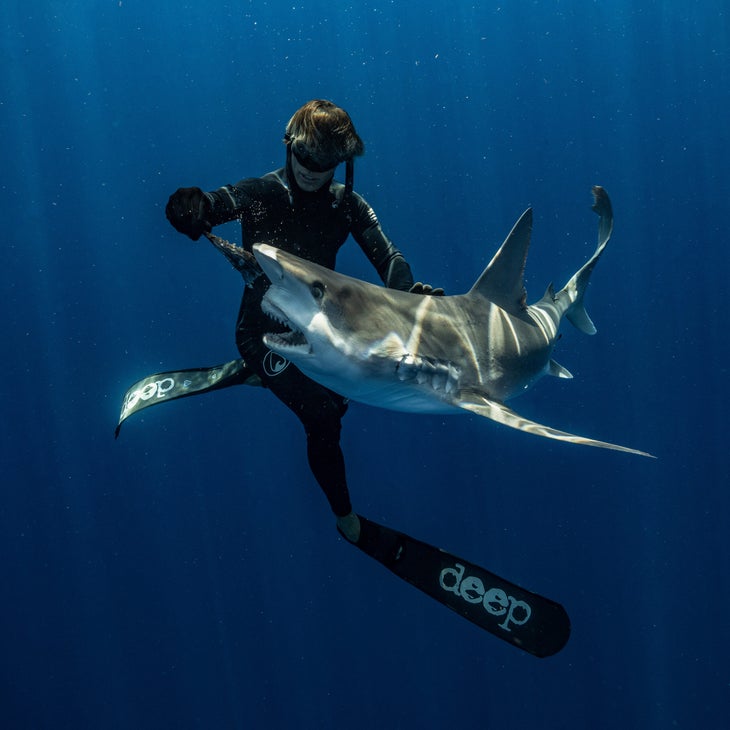
Mansell said that some of the species of sharks caught in the line were also protected by law. “That’s the thing about a long line,” Mansell explained. “You can’t control who shows up and bites it.”
No other boats were in sight, he said, and he and Moore were unsure of what to do with the trapped animals. Mansell said the two called law enforcement to seek advice: the Florida Fish and Wildlife Conservation Commission (FWC), which patrols state waters, and then, through an employee of Mansell’s dive company on shore, a hotline for the National Oceanic and Atmospheric Administration (NOAA), the federal agency in charge of, among other things, protecting marine ecosystems.
NOAA declined to comment for this story, and the FWC did not respond to requests for an interview. In a 2022 press release, the U.S. Attorney’s Office in the Southern District of Florida acknowledged that Moore and Mansell called law enforcement, but said the men failed to mention that the line was attached to “a properly marked buoy.”
Mansell told Outside that the advice he received from the government was, at best, opaque. So he and Moore freed the sharks, cut the line, and hauled three miles of it into their boat, as their clients captured the ordeal on their smartphones.
As it turned out, the longline had been set by a seafood distributor that possessed a rare, highly-coveted “no limits” research permit from NOAA to use a longline to catch sharks. According to the federal register, in 2024 NOAA granted only three no-limits permits to fishermen.
“There are only a handful of them given out in the entire continental U.S. because of how destructive it can be when people are killing sharks indiscriminately,” Mansell said.
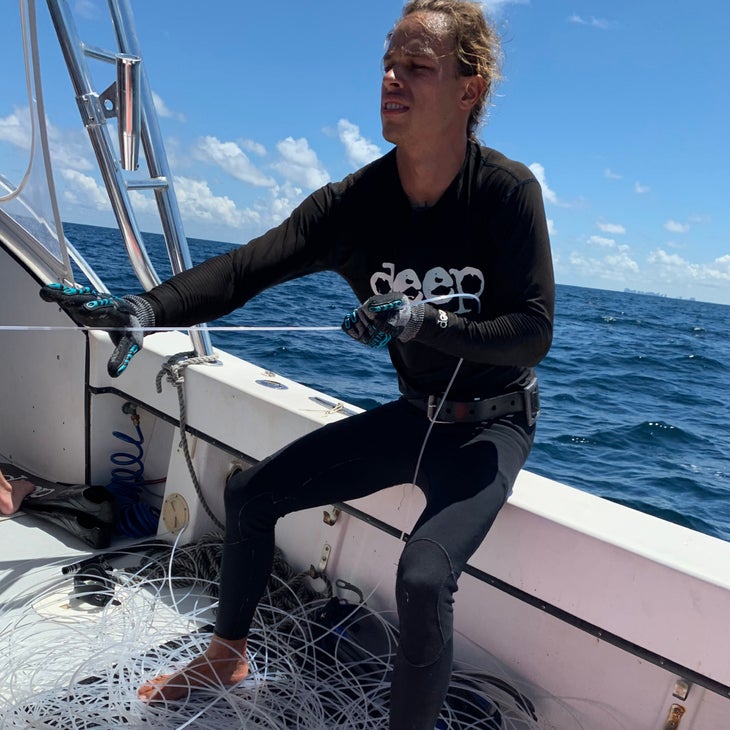
According to The Palm Beach Post, in the weeks before the line was cut, the fisherman who placed it had announced his intentions intentions to set a longline off of Jupiter in a Facebook post.
Even though Mansell and Moore didn’t remove the entire longline—which prosecutors said was worth around $1,300—because they had tampered with it and freed the sharks, the two were charged with the theft of commercial fishing gear in federal waters, a felony.
Mansell said the events caught him off-guard. He thought that freeing the sharks had been the right thing to do. But since they were hooked on a line belonging to the distributor, prosecutors accused them of theft. “Because we let them go, that was stealing,” he said. “I found myself in this political mess.”
According to the Miami Herald, prosecutors argued that Mansell and Moore knew that the longline was legal, yet cut it and freed the sharks.
Moore, a former commercial fisherman, told the Miami Herald that if the duo had believed the fishing line to be legal, they would have left it alone.
“They tried to paint me as like some environmental terrorist,” Moore told the newspaper. “And, I’m far from it.”
On December 6, 2022, a federal jury in the Southern District of Florida found Mansell and Moore guilty of theft of property.
The Impact of a Felony Conviction
The felony conviction changed Mansell’s life. In February 2023, he and Moore were sentenced to one year of probation. And instead of the $250,000 they could have been charged, the men were ordered to pay $3,343 in restitution, to compensate for the lost line and the freed sharks.
But Mansell’s public record was forever tarnished. As a dive guide, he made much of his living traveling internationally, taking tourists on trips to the Caribbean, South Pacific, and other far-flung locales. It became incredibly difficult for him to travel outside of the United States, he said, because applying for most foreign visas requires disclosure of criminal history. State-by-state, convicted felons also face restrictions in a slew of other areas, including voting rights, firearm rights, parental rights, and a variety of public social benefits.
“This conviction led to years of my life not being able to travel for work,” Mansell said. “Traveling and guiding is what I did for a living. Basically, my entire job got taken away from me.”
Mansell and Moore spent the next two years battling to clear their names. Their legal fees soared, and a GoFundMe page eventually raised $28,000 to defer costs of lawyers and appeals.
Both men filed appeals to the conviction in 2023, and a district court in Florida heard their appeals case in June 2024. But the court ruled against them. In her conclusion, however, the district judge indicated that the two had successfully proven their point—that they believed they were doing the right thing.
“They are the only felons I have ever encountered, in 18 years on the bench and three years as a federal prosecutor, who called law enforcement to report what they were seeing and what actions they were taking in real time,” Barbara Lagoa, the circuit judge, wrote in her conclusion. “They are felons who derived no benefit, and in fact never sought to derive any benefit, from the conduct that now stands between them and exercising the fundamental rights from which they, are disenfranchised.”
A Surprise Pardon
On May 28, 2025, nearly five years after he cut the longlines, Mansell got good news.
He’d just boarded an airplane when, out of the blue, he received a call from his lawyer. “He said ‘You just got a full pardon from the President of the United States,” Mansell said.
“I couldn’t even speak,” Mansell added. “I didn’t know what to say. I just sat there in shock and silence. It was probably the best news I had ever heard in my life.”
Mansell and Moore were among 16 other criminals pardoned by Trump.
Mansell said his legal team never reached out to the White House seeking a pardon. Instead, lawyers from the Cato Institute, a libertarian think tank, included Mansell’s story while testifying before the U.S. House of Representatives about over-criminalization. In December, 2024, the Cato Institute had filed an amicus brief with the district court—an official request—to overturn the conviction.
While Mansell was overjoyed at the presidential pardon, his excitement was tempered by the realization that his crimes haven’t technically been erased.
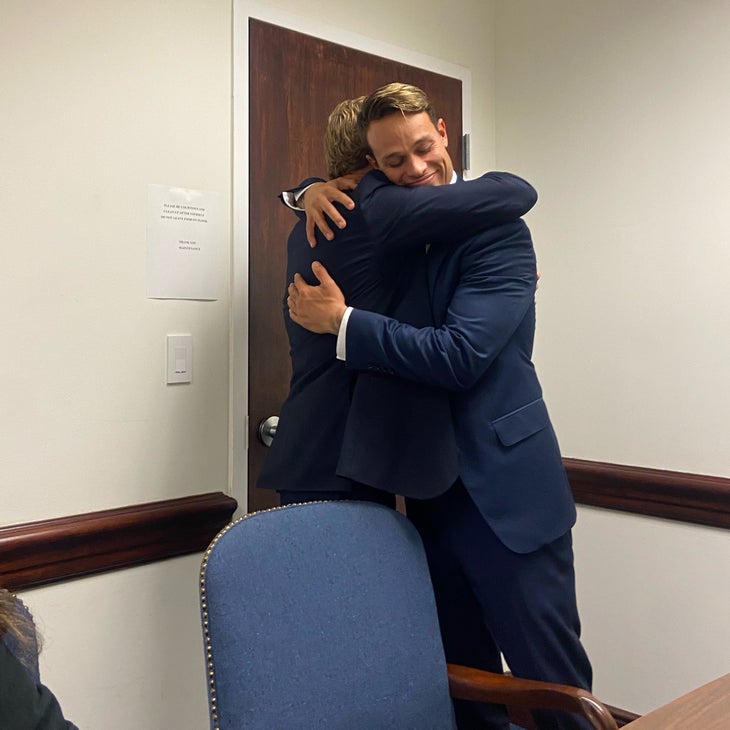
“Technically, it’s still on the record, which is a bit of a buzzkill,” Mansell explained. He still has a criminal history, and is required to disclose his record any time he travels.
“New Zealand, Australia… All these places I guide require on your travel visa to mark if you have a criminal history—and I do,” he added. “If you mark that, you get put in a different section, and have different hoops and bounds to go through.”
But other rights have been restored. He can vote, own firearms, access public housing, and apply for federal or state grants, for example.
“Still, it’s pretty epic. I’m stoked,” he said. “I can do all the normal things an ordinary citizen can do.”
Although he’s mostly back to his normal life as a dive guide, Mansell told Outside that things still aren’t quite the same for him. He’s become fearful of accidentally breaking the law during his diving trips—a fear he had to overcome when his crew saw the gasoline cans bobbing in the waves this past June.
Eventually, Mansell’s crew convinced him to let them load the leaking gas cans onto his boat. They motored into shore having removed toxic fuel from the ecosystem. But for the rest of the day, Mansell expected the worst.
“Every day I go out off the coast of Florida, there’s a touch of anxiety and distrust,” he said. “That joy that I used to have every time I went out there, it’s changed. It’s going to be a battle to overcome that.”
The post After a Trump Pardon, This Shark Diver Is Putting His Life Back Together. It’s Not Easy. appeared first on Outside Online.











